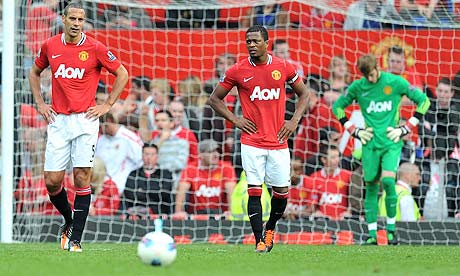
The sin Sir Alex Ferguson nailed his players for in Sunday's Manchester massacre is more often a great United virtue: the pouring forward of red shirts in pursuit of a seemingly lost cause. Against City, unusually, defiance appeared to the manager as self-destruction, and in the inquest that followed the most senior defenders took the biggest Fergusonian blast.
United have built an identity around never giving up but all rhetoric falls down some days. Ferguson's teams will pursue a bolted horse all the way to Cornwall. Clive Tyldesley's "United always score" line is every fan's favourite TV affirmation of the club's stubbornness. Ferguson taps his watch on the sidelines as a warning to the opposition. "You are going to concede," he is saying. "There is nothing you can do."
Until City's onslaught at the weekend there was no record of him saying he would have settled for a "3-1" defeat, especially at home. This startling admission became wrapped up in the power-shift theory, which was legitimate, on Sunday night, given the scale and manner of City's conquest. But since we can be sure Ferguson has not reinvented himself as an exponent of damage-limitation exercises we will need to look elsewhere for an explanation of his comments as United prepare to face Everton in Saturday's high noon game at Goodison Park.
The first point is that United were cut to 10 men from the 46th minute but were only 1-0 down at the point when Jonny Evans was dismissed for yanking at Mario Balotelli's shirt. It took another 24 minutes for City to go 3-0 up before United struck the blow that caused their next problem. Darren Fletcher's sweet finish 10 minutes from the end prompted the loss of defensive self-control that opened the gates to three more City goals and a statistical calamity.
Patrice Evra, the captain, and Rio Ferdinand, the team's most experienced centre-half, were the two main culprits: Evra for flying forward and Ferdinand for not organising the central defensive area. In the 3-3 home draw with Basel it was noticeable that Ferdinand was failing to exert any restraining influence on the 19-year-old Phil Jones, whose nomadic energy outweighed his sense of danger. The older man is having such a hard time marshalling his own fraying game that arranging anyone else's seems beyond him.
United's campaign so far can be cut in two. A 1-1 draw at Stoke five weeks ago preceded the wasteful draw with Basel, an unconvincing 2-0 win against Norwich and a laboured share of the points at Anfield. A recovery mission in Romania (the 2-0 win at Otelul Galati) foreshadowed the evisceration by City. Before this run United had skipped through autumn, beating Spurs 3-0, Arsenal 8-2, Bolton 5-0 and Chelsea 3-1.
What happened? Tom Cleverley limped off in the Bolton game on 10 September. Yet United are not so reliant on a lad who has made four Premier League starts for that to be the cause. Cleverley's injury sucked the thrust and energy from United's midfield, certainly, and the lack of stability in the partnerships at centre-back is another contributory factor. In essence, though, the fault has been far simpler: too many established United stars dimming out at the same time – a failure of application.
"They always give me nudges," Ferguson said of the shadow side that won 3-0 at Aldershot in the Carling Cup on Tuesday night. He meant players such as Dimitar Berbatov, Michael Owen and Antonio Valencia. These fringe candidates were on a winner with the jaunt to Hampshire. It was their chance to show the first XI there are squad players who will snatch their jerseys if the paralysis carries on.
Not only Berbatov and company but the next wave, too. Paul Pogba and Ravel Morrison were granted minutes and Larnell Cole was in the squad. At Everton, Ferguson confronts an ancient dilemma and one he knows well. How much punishment should he mete out for the humiliation at the feet of City? Who has lost his right to be in that team?
Rotation is used primarily for rest but United will employ it now for retribution. From the Liverpool and City games, Ferdinand, Evra, Evans, Anderson, Nani, Fletcher and even Ashley Young ought to be waking up feeling vulnerable. Young's bright start has fizzled out, not completely, but enough to raise doubts about his potential to succeed Ryan Giggs (questions he still has plenty of time to answer).
If a short sharp shock is in Ferguson's thoughts he could exclude all or most of the above at Everton and promote or restore a group from Nemanja Vidic, Jones, Michael Carrick, Park Ji-sung, Javier Hernández, Antonio Valencia, Cleverley, Berbatov and Owen. Managers prefer to make these adjustments individually rather than en masse but the evidence of stagnation was too stark against Liverpool and City for the manager to adopt the more subtle method.
Sometimes "bouncebackability", to revive Iain Dowie's phrase, derives not from the whims of players but the dire consequence of omission, from cold fear. In Sunday's aftermath Ferguson seemed to be saying he saw senior pros fail their club. No one does that for long.

